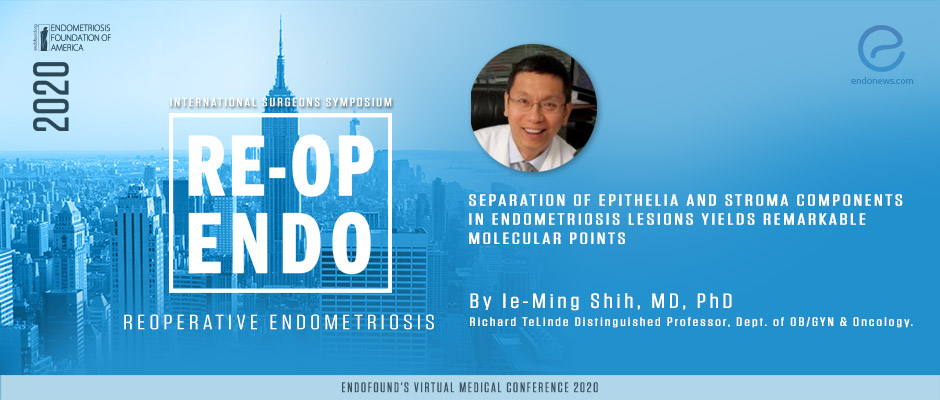Separation of epithelia and stroma components in endometriosis lesions yields remarkable molecular points - Ie-Ming Shih, MD, Ph.D.
Jan 7, 2021
Recent molecular features of endometriosis and adenomyosis via separation of epithelia and stroma
Key Points
Information for the presentation: Ie-Ming Shih, MD, Ph.D. is Te Linde Professor of Gynecologic Pathology at the Johns Hopkins University School of Medicine who is co-directing the Breast and Ovarian Cancer Program in the Sidney Kimmel Comprehensive Cancer Center. Dr. Shih’s research impacts medicine and gynecologic diseases in many ways.
Importance:
- The pathologies of adenomyosis and endometriosis are unique among non-malignant gynecological diseases and provide fertile research topics. In this regard, there are intriguing suggestions as peritoneal endometriosis and adenomyosis seem to be molecularly related.
Highlights:
- Research by molecular techniques on eutopic and ectopic endometrium by separating epithelia from stroma has been rewarding. Whole-exome sequencing besides global methylation profiles utilizing this separation technique was done in recent research yielding interesting conclusions.
Remarks:
- Research on somatic mutations indicates clonal derivations in both ectopic and eutopic endometrium epithelia and stroma, i.e., origin from the same progenitor cells. Adenomyosis lesions are distinguished from eutopic endometrium with a patient-specific methylation feature.
- Data presented here are revolutionary in regard to the role of endometrial stroma in the development of both adenomyosis and endometriosis.
Lay Summary
The pathologies of adenomyosis and endometriosis are unique among non-malignant gynecological diseases and provide fertile research topics.
Ectopic endometrial tissues may have distinct molecular changes distinct from eutopic endometria despite having similar morphology. In this regard, there are intriguing suggestions as peritoneal endometriosis and adenomyosis seem to be molecularly related. Research made on molecular aspects of eutopic and ectopic endometrium by separating epithelia from stroma has been rewarding.
Whole-exome sequencing besides global methylation profiles utilizing this separation technique by laser-capture microdissection was done in recent research yielding interesting remarks. Somatic mutations that are found in molecular studies indicate clonal derivations of the epithelium and stroma of ectopic and eutopic endometrium making it plausible to suggest an origin from the same progenitors.
Besides, tissues from adenomyosis are different from eutopic endometrium showing patient-specific methylation features.
Conclusive remarks of these molecular findings are revolutionary in regard to the role of endometrial stroma in the development of both adenomyosis and endometriosis.
Research Source: https://www.endofound.org/peritoneal-endometriosis-and-adenomyosis-are-molecularly-related-to-eutopic-endometrium-ie-ming-shih?pop=mc
adenomyosis endometriosis molecular DNA methylation mc2020

